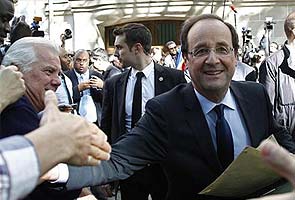
Paris, May 15: Francois Hollande will be sworn in as France's first Socialist president in 17 years in a hurried ceremony on Tuesday before a dash to Berlin to challenge German Chancellor Angela Merkel's focus on austerity policies.
Mr Hollande, whose election comes as the euro zone is teetering back into crisis with fears about Greece's future in the single currency, will give his first presidential news conference in Berlin in the evening, flanked by the centre-right Merkel.
His first words as president will be keenly watched by financial markets eager for reassurance that his push to tack pro-growth instruments onto Europe's budget discipline treaty will not sour the start of his relationship with Merkel.
Any indications on initial economic policy moves will also be scrutinised both outside France and inside, where frustration over rampant unemployment and a sickly economy were key factors behind conservative Nicolas Sarkozy's defeat.
Mr Hollande, who said on the night of his election that the weight of events in Europe forced him to keep his celebrations short, said on Monday he knew he would be judged on how he starts his presidency.
Anxious not to lose the "Mr Normal" image that appealed to voters tired of his showman predecessor, Mr Hollande has asked for his 10 a.m. (0800 GMT) inauguration ceremony to be kept as low-key as possible.
In a break with tradition, he will invite just three dozen or so personal guests to join some 350 officials at the event and neither his nor his partner Valerie Trierweiler's children will attend.
That said, the man who until recently chugged to work on a scooter will still be presented with the official chain of office, a gold collar weighing nearly a kilogram and engraved with the names of all Fifth Republic presidents.
He will then be taken on a traditional victory spin down the Champs Elysees avenue in an open-topped car.
Mr Hollande is set to name civil servant Pierre-Rene Lemas as his chief of staff shortly after his swearing-in. Germanophile Jean-Marc Ayrault, who has strong contacts in Berlin, could be named prime minister later in the day.
Before that, Mr Sarkozy will go through the ritual of entrusting his successor with nuclear codes and other secret dossiers, and Mr Hollande will eat his first lunch as president with Socialist former prime ministers Pierre Mauroy, Laurent Fabius, Michel Rocard, Edith Cresson and Lionel Jospin.
Mr Hollande has picked an upscale hybrid Citroen as his official car and has had it fitted with a flat floor and a rail he can hold onto while standing up and waving to the public.
Aides said palace chauffeurs were frantically practicing driving the hybrid car without stalling it.





Comments
Add new comment